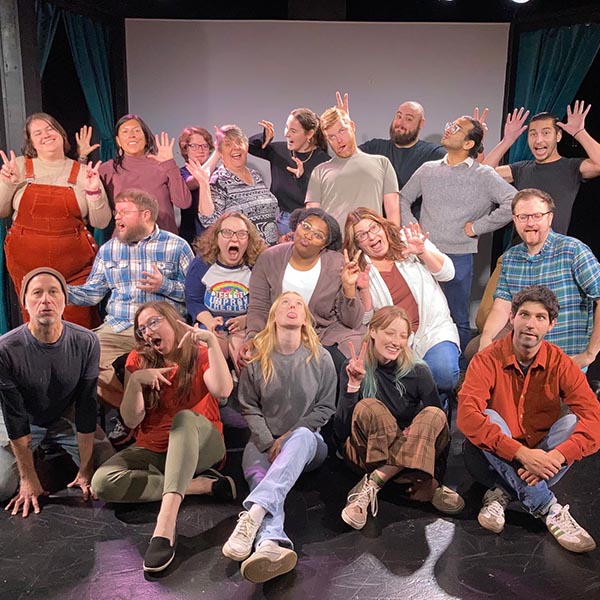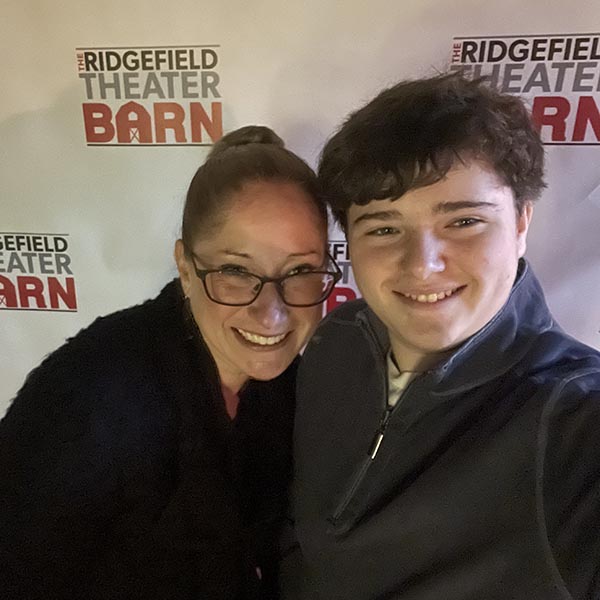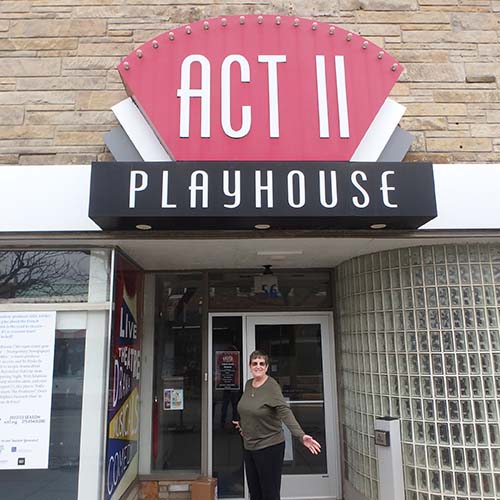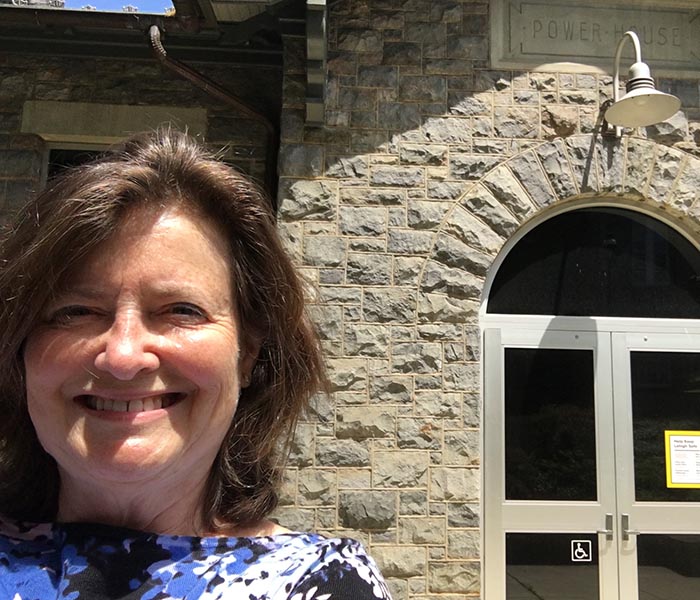CAST
Celeste Varricchio ’73
English with a Concentration in Theater
Producing Artistic Director, Mosaic Dance Theater Company
Susan Schmider Galletti ’79
Accounting
Senior Vice President, Gramercy Property Trust
Board Member, Act II Playhouse
Patricia Spugani '80
Mathematics and Technical Theater, Dual Degree
Chief of Staff, IBM (retired)
Board Member, Community Outreach, and Lighting Designer, Town Players of New Canaan
Debbie Schwartzberg Levy ’91
Psychology with American Literature Minor
Customer Success Manager for the Northeast Region, Cengage Group
Performer, Steel City Improv
Jennifer Engel ’98
Psychology
Senior Vice President, Market Research, PRS in VIVO Group
Board Member, Ridgefield Theater Barn
Kayla Loree ’15
Psychology with Minor in Theater and Health, Medicine, and Society
Programming Operations Manager, Washington Performing Arts
Scene 1
A dark theater. The lights are down, the curtain comes up, and the seats are empty. COVID-19 has forced schools, businesses, and art venues to pivot. The federal government has intervened on behalf of the arts with the Shuttered Venue Operators Grant program with monies distributed by the Small Business Administration. The program passed along $16 billion for theaters, music venues, and other cultural institutions, helping to save many nonprofits from a catastrophic fate during the pandemic — but only to those arts organizations with at least one full-time employee.
Suddenly a spotlight flicks to life, circling the center stage in light. A lone figure walks out and places a laptop on a stool. The person addresses a Zoom screen. The monologue begins with an announcement of a full slate of performances to return next season. There is no roar with excitement across the virtual distance. The announcement includes performer names and dates. “The show must go on,” the person says and adds, “Please come back and support us.” The laptop closes and the light snaps off.
Scene 2
The Challenges of COVID-19
Setting: Act II Playhouse, Ambler, Pennsylvania
Galletti has been a subscriber and donor at Act II for 17 years and has sat on the board since 2016, assisting with accounting and the year-end audit. The theater’s typical season includes six shows, plus a children's holiday show, and cabarets and comedy nights during the summer. Those shows use talented equity actors and nearly fill the 136-seat house, thanks in part to a loyal subscriber base and a range of shows that appeal to a broad audience.
During COVID-19, the theater shut down and pivoted to virtual programming. “Government funding programs helped to subsidize our fixed costs,” Galletti says. “While we had no furloughs, we still lost capable and committed people.”
 Setting: Steel City Improv, Pittsburgh, Pennsylvania
Setting: Steel City Improv, Pittsburgh, Pennsylvania
Yes, n’at. The common improv phrase takes on a Pittsburgh regionalism as Levy learns as a performer to accept what’s thrown at her. Living in the moment is how her improv career began. She attended a show at Steel City after a devastating personal tragedy. “I needed to feel joy again and was having a hard time finding it,” she says.
A night at Steel City at the cost of $10 a ticket was an easy fix. It led her to sign up for a level 1 class. When she announced it in her home, her husband gave a deadpan answer: “Do we have to go with you?”
Since Steel City is a tiny nonprofit operated by volunteers, the pandemic was less of a groaner for the group. Classes and performances continued during the pandemic. While a virtual approach wasn’t always easy for learning, reacting, or viewing, the audience and participants adjusted. Now the normal wall of class pictures has added Zoom screenshots and masked group photos.
Setting: Town Players of New Canaan, New Canaan, Connecticut
Spugani has balanced work and play since her days at Lehigh. Her theater days began by helping at the theater box office as a freshman, as she was looking to get involved in an activity outside her studies. She dabbled in acting and stage management but found her passion with stage lighting at The Power House Theater (or Wilbur Drama Workshop), then the only stage space on campus, and graduated her senior year as president of Mustard & Cheese.
Following a career spent at IBM, she once again sought a creative outlet and returned to theater, finding the Town Players at another Powerhouse Theater on the grounds of Waveny Park. There she “paints with light” as resident lighting designer while her husband built sets. Fortunately, a string of sold-out performances in their 110-seat theater closed March 8, just days before the pandemic quarantine.
While this community theater was closed to live audiences for 16 months, it was the first local theater to pivot to virtual performances, showcasing monologues broadcast live from The Powerhouse stager. Between low-cost tickets and a long-term lease with the town, the all-volunteer board was able to cover operational expenses during the pandemic. Supporting arts grants from Connecticut Humanities helped, too. “All of us at Town Players are proud of what we did and the quality of the work presented during the pandemic,” Spugani says.
 Setting: Washington Performing Arts, Washington, D.C.
Setting: Washington Performing Arts, Washington, D.C.
As a senior at Lehigh, Loree fell in love with theater. The psychology major then pursued a master’s in theater. “I seem to be a right-brained person in a left-brained world,” she says. In 2021 during the middle of the pandemic, she accepted a position as programming and production coordinator and then was promoted to her current position at Washington Performing Arts. “The team at Washington Performing Arts saw the pandemic as an opportunity to challenge themselves,” she says.
Washington Performing Arts launched a home delivery series featuring well-established as well as up-and-coming artists who were filmed at one of Washington Performing Arts’ regular venues, with the footage then edited for release to patrons. The nonprofit launched other initiatives that allowed audiences to watch panel discussions with performers and behind-the-scenes footage. These virtual shifts were successful and prioritized the artists during this financially difficult time.
Setting: Mosaic Dance Theater Company, Glen Ridge, New Jersey
Varricchio transferred to Lehigh and immediately was involved with Mustard & Cheese and then headed to a professional theater program in Dallas, Texas, where she earned her MFA. When she returned to the New York City market, theater jobs weren’t always easy to find. She accepted the performing roles she landed but also worked in other capacities alongside a producer and as an assistant and tech.
All the while she continued her dance training, which she incorporated into the one-person shows she began touring in the 1990s. “Compared to other countries, the United States is not very dance savvy,” she says. “So dance can be hard to book and sell.”
Yet she has done just that for 20-plus years with her own dance company, producing a number of shows dedicated to the folkloric traditions of the Mediterranean — North Africa, Middle East, and southern Europe. “We often book with universities and schools in order to help educate young people about the beauty of these cultures,” she says.
When the pandemic began, tours stopped. The company offered several videotaped performances that were edited and shared. The bulk of the company's time was spent on a streamed monthly mini-documentary series that spotlighted a different region or country’s dance style. It was grant funded and helped her company stay active.
 Setting: Ridgefield Theater Barn, Ridgefield, Connecticut
Setting: Ridgefield Theater Barn, Ridgefield, Connecticut
Engel remembers going to Broadway shows with her grandmother and has had a passion for theater ever since. She wanted to pass that passion on to her children and introduce them early to the power and job of live performance. Both of her children are involved in the arts. While she is a board member at Ridgefield Theater Barn (RTB), her son as a high school student runs all of the tech.
RTB is funded in part by the town and state, but that didn’t cover costs during the pandemic. “Missing a season is hard for theaters like ours,” says Engel. “We can’t afford that loss.” RTB had a few Facebook Live events during the pandemic to keep the community engaged.
Scene 3:
A Return to Normal
 Setting: Act II Playhouse, Ambler, Pennsylvania
Setting: Act II Playhouse, Ambler, Pennsylvania
Galletti and the board and staff at Act II are working to rebuild the subscriber base, which sits around 60%. While audiences wait to commit to a full slate of shows, Act II is focusing on single-ticket sales. “We seem a bit caught as older audience members are hesitant to sit elbow-to-elbow with strangers while younger audience members decide where to spend their dollars,” she says. “For younger patrons, a night at the theater isn’t cheap between tickets, a meal, and a babysitter.” And for playhouses like Act II, licensing rights for shows and equity actors’ salaries are also going up.
Still the company is staging top-notch productions and working to bring audiences back. Its most recent show, Steel Magnolias, just ended its run and saw an audience diverse in age and comfortable in sharing proximity. “Our season was well received against our post-COVID-19 expectations,” she says. “But we are far from recovered. We will announce our 23-24 season at the end of March, and the subscription sale response will be crucial.”
Act II is also seeking contributions from foundations and local businesses, but so does every other area nonprofit, and there is only so much to go around. Galletti urges everyone to see a show at a local theater and patronize a nearby restaurant.
Setting: Steel City Improv, Pittsburgh, Pennsylvania
Audiences have returned to shows. Maybe it is the hip district location. Maybe it is the low cost. Maybe it is the good laughs. Yes, and, to all three. Levy has advanced through classes and plans to audition for a house team, which will mean two shows each Friday and Saturday night. “This gave me what I was looking for,” she says. “It’s brought laughter and joy. There is a Jewish word, ‘bashert,’ which means ‘meant to be.’ ”
 Setting: Town Players, New Canaan, Connecticut
Setting: Town Players, New Canaan, Connecticut
Town Players opened its 2021 season with On Golden Pond, but the audience was slow to return. It operated far below capacity. The second and third shows of the season sputtered as some ran as normal and some performances were canceled as cast members and crew fell sick. The fourth show of the season was finally back at capacity with no cancellations. But the fifth and sixth show had similar ups and downs.
“We doubled down on our marketing efforts,” says Spugani. The group targeted families who had moved into town and put signs up in the park to attract park visitors who were out walking. “We increased our community outreach,” she says. “I visited many local organizations to promote our shows.” We are now back stronger than ever, just closing a successful run of Ordinary People that also promoted local mental health resources.
The community theater has not slowed down as it began a capital campaign to expand, building a new lobby and establishing a youth theater program. “We want to leave the theater ready for the next generation,” Spugani says.
Setting: Washington Performing Arts, Washington, D.C.
The audience has returned to Washington Performing Arts. Is it at capacity? No. But there is a good house. “We have the world in our city,” says Loree. “Our patrons are passionate about the global stage and actively part of the arts scene.” Those patrons seem to be navigating a new normal with performances delivered at home and on stages.
Washington Performing Arts seems to have a finger on the pulse of what’s working at its various venues and a management and strategic team that looks at the bigger picture and adapts based on what the members foresee. “I am really thankful for that,” Loree says.
Setting: Ridgefield Theater Barn, Ridgefield, Connecticut
Despite vaccine mandates and masking policies, the crowd returned. It helped that the first show was a fun romp written by a local community member. But challenges remain as RTB faces what many regional theaters are navigating: an older audience base and a challenge to attract a younger crowd. RTB is trying some alternative programming in hopes of attracting that younger audience, including a piano bar, open mic, and improv.
“We are trying to bring the energy as we launch a capital campaign that will add a small black box theater, workshop, and classrooms,” Engel says. “We are hiring staff to help direct where we want to head while thankful for all the volunteer hours our community members provide.” Soliciting corporate donations, finding state grants, and updating marketing and social media seem key to RTB’s goals.
 Setting: Mosaic Dance Theater Company, Glen Ridge, New Jersey
Setting: Mosaic Dance Theater Company, Glen Ridge, New Jersey
With many schools restricting outside events, booking as the world reopened was hard. “We know it will be difficult to get back to pre-COVID numbers,” says Varricchio. In 2022 her show Troy: Women & War was the theater company’s first live performance in three years. But her mainstay, university performance series and campus activity offices, are regaining momentum and beginning to seek the variety of shows her company has written, produced, and toured for years.
“The creative fires continue to burn,” Varricchio says. “The flames don’t go out and want to be fed. We just hope an audience is ready to feel that burn.”